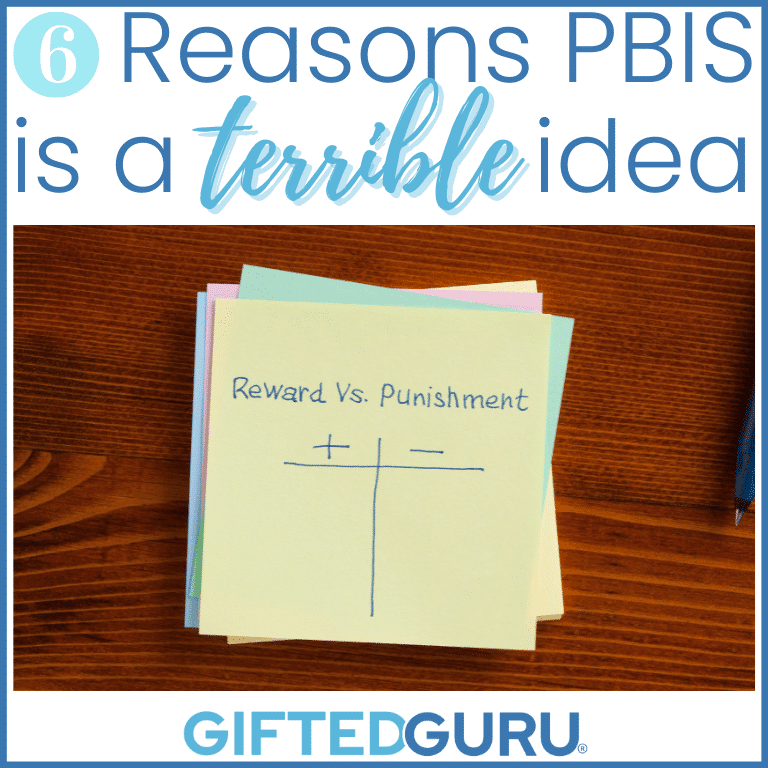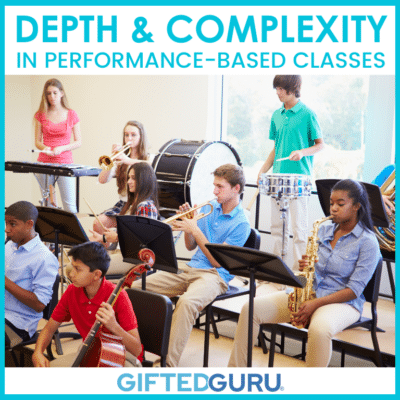I loathe PBIS even more than I loathe Accelerated Reader, and friends, that’s a high bar.
Why I think PBIS is a terrible idea
To be fair, it’s not just PBIS. It’s all of the same type of behavior management systems that use often elaborate systems to punish and reward behavior in the hopes that students will behave in a way desired by schools and teachers.
All of these systems are based on the ideas of B.F. Skinner who is credited with the idea of radical behaviorism. Skinner (who died in 1990 and so can’t defend himself) thought and taught that the only thing that really changed behavior was consequence: if something good happened after you did something, you’d do it more. If something bad happened, you’d do it less.
You may have heard this called the “carrot and stick” approach: reward behavior you want to see more of, and punish behavior you want to see less of. Sounds great. Except how it’s not.
Here are six reasons I think PBIS is a terrible idea, and what I say about PBIS applies to all similar programs. I’m an equal opportunity hater. I could come up with way more than six, but this is a core sample.
#1: It doesn’t work.
Let’s just get this one out there first. It actually doesn’t work. I’ve written about Dan Pink’s book Drive and Alfie Kohn’s Punished by Rewards that explore the many, many problems with this kind of motivational theory.
The bottom line: it doesn’t work.
- It expects the unreasonable. It’s unreasonable to think that if adults simply handled the situations better, the kids would be perfect angels. Friends, this is simply not true. Not all behavior is a result of adult interaction or lack thereof. Skinner was criticized for basing his ideas on animals, and I’ve even seen a pretty well-known book about PBIS that compares this dynamic to dogs and how we shouldn’t blame dogs for their behavior, and instead we should blame the owners. I’m going to state the obvious: kids aren’t dogs. Kids are complex humans with much more cognitive ability than canines.
- If I don’t care about your punishment or I don’t value your reward, what do you have? That would be nothing. My son’s 1st grade teacher had a PBIS system of colored bears that still makes me see red when I think about it. The damage that system did to him (and me) was lasting. He rejected her system, and we battled it all year.
- If one teacher doesn’t do it, the whole system falls apart because it depends upon conformity. The PBIS website, which I refuse to link to, even says you shouldn’t do it if 80% of the staff doesn’t buy in. I’ve rarely seen a school where anyone actually asked teachers before they decided to do something like this, so I don’t know how you’d know you had buy in, but whatever.
- Under these systems, the students who behave well would probably have behaved well anyway, and the worst behaved students often end up with the most rewards.
It will probably not surprise you to learn that PBIS was invented by the federal government and the PBIS website is run by none other than the Department of Education. Your tax dollars at work. I should probably stop right here because that should tell you pretty much everything to need to know.
(At the end of the article I’ll explain why the research often show it works even though most teacher/student experience shows otherwise.)
#2: It’s disrespectful.
Skinner completely rejected the idea of free will. He believed that we only behaved the way we did because of the reinforcement we received. To me, acting as though students cannot be trusted to learn how behaving in certain ways makes it more pleasant to be at school is completely disrespectful to them.
It sends this message: You cannot be trusted to make good decisions and must be rewarded or punished over and over again. You will never “graduate” from this program. You’re lucky you have us here to reward and punish you, or we’d all descend into Lord of the Flies. You are my puppet, and you dance to the pull of your strings.
It’s insulting.
It’s particularly insulting to gifted kids, who are capable of deep thinking about morality. If you want to know more about the social and emotional aspect of giftedness, I have a truly amazing course on it you can take. Learn more about the Social and Emotional Needs of the Gifted course.
#3: It punishes good kids.
Our reticular activating systems are programmed to notice differences and discrepancies. Because of this, the idea that we’re going to “catch kids being good” means that teachers are far more likely to notice desired behavior in kids who usually don’t behave well than they are to notice it in the normally well-behaved.
This means that the “good” kids are far less likely to earn the rewards than “bad” kids who reform misbehavior, even temporarily.
I’ve personally witnessed kids deliberately setting up situations to get “caught” being good.
It’s not about behaving well; it’s about the reward. They’re not learning how to live in a community. They’re learning how to manipulate a system to get a reward.
That’s no system. Well it is, but it’s terrible.
Also, many gifted students reject the hypocrisy and inherent unfairness and may actually begin behaving less well than they otherwise would have in rebellion.
Ironically, this means they are more likely to get a reward when they do something “good.”
#4: It makes it harder on those who come after.
This may come as a shock to students at PBIS schools, but when I walk around in my daily life, no one offers me reward recess for doing the right thing.
If a student gets used to being rewarded for every little thing and not having consequences for misbehavior, their view of the world will be very, very skewed.
I actually think there is a connection between this idea and tip jars popping up in places like fast food restaurants where people seem to expect to be rewarded for simply doing their jobs.
If you reward something, you’d better plan to keep rewarding it because these reward systems are like potato chips: you can’t stop with just one.
#5: It puts teachers at the mercy of student behavior.
In many schools where PBIS is implemented, there are restrictions on how misbehavior is handled. The idea is that you try to ignore it and reward positive behavior.
Because of this, teachers are often not allowed to send a student to the office until certain conditions are reached (e.g., parents are called multiple times, you’ve tried positive reinforcement, etc.). That unecessarily hampers the ability of the teacher to intervene in often very serious situations and makes classrooms less safe.
It also makes PBIS look falsely successful. “Look how few referrals we’re getting!” (Teachers aren’t allowed to write them.) “Look how few suspensions we’re giving!” (Even egregious behavior goes unaddressed.)
One example on the PBIS site encourages teachers to say things like, “If we can make it through this discussion without inappropriate language, you can listen to music during your independent work time at the end of class.”
I’ve also heard these kinds of statements: “Well, we were going to do this cool activity, but I guess we won’t since you guys won’t/didn’t/can’t fill-in-the-blank.”
Are you kidding me? I am the teacher. I decide when we do what, and I am not controlled by the behavior or misbehavior of students. (See also #7 below.)
Additionally, we shouldn’t need to praise kids for behaving in ways they already knew they should behave. That is false and hollow praise.
One example of good implementation on the PBIS website is that if a student isn’t using lab equipment correctly who already knew how, you stop, remind them how to use it correctly, and then praise them for using it correctly.
I think you can tell how I feel about that.
#6: It’s coercive and manipulative.
PBIS recommends comments like, “I like the way Aisha is sitting.”
Theoretically, the other students are supposed to A) care about what the teacher likes, and B) want to be like Aisha.
The reality is that they now hate Aisha, and she is very likely to end up getting razzed by other students if this kind of thing happens often. Bullying is not off of the table, either.
Also, the other kids who were also sitting appropriately but who didn’t get singled out for this manipulative false praise are thinking, “Why didn’t he say anything about how I am sitting? I’m sitting nicely.” And next time, they just might not even care how they’re sitting because they know they won’t be noticed anyway.
Inherent in the praise of one student is the silent criticism of another. This sets up an unhealthy competitive environment that pits student against student.
It is poor practice to use the behavior of a peer to try to force the behavior of another. Think of it this way: In a family, we would all agree it’s a bad idea to say to one sibling, “Why can’t you be more like your brother?”
And yet, this is exactly what this dynamic is. It’s not healthy in homes, and it’s not healthy in schools.
PBIS is terrible.
I didn’t even mention how fake it can feel, how often kids don’t even care about the rewards, how much time it wastes, and how it often results in group punishment/reward.
Some may be wondering what I suggest you do instead. Well, frankly, just about anything. That sounds flippant, and I don’t mean it that way, but there are some basic practices that help:
- consistency and clarity of expectation
- building of true relationships
- excellent parenting
- real consequences for unacceptable behavior
- recognition of the fact that children are still learning and growing
None of these are easy, and none of them is a panacea.
I know that it is likely that some with disagree with me, and I would invite those of you who do disagree to actually read some of the real research done on the danger of rewards and true motivational theory, not just research on PBIS.
Where did PBIS come from?
PBIS popped up in the 1980s and 1990s because people were getting worried about how schools were handling discipline, especially for kids who had a tough time with behavior or who had disabilities.
It’s all rooted in applied behavior analysis (ABA) and the idea that we should be more proactive and use solid research to help students, particularly those with disabilities. PBIS was supposed to be a way to ditch the old-school, punishment-heavy stuff like suspensions and move towards a more positive, school-wide approach.
Like so many things, it sounds good on paper…
A bunch of researchers and educators put PBIS together, with George Sugai and Amy McCart playing big roles. They got a lot of help from federal funding and academic work. Sugai, a professor at the University of Oregon, and McCart, who was also tied to Oregon’s education research scene, are the ones who really got PBIS into a structured form.
They took ideas from earlier behavioral research, like B.F. Skinner’s Behaviorism (as I mentioned before), and turned it into a practical system for schools.
The U.S. Department of Education’s Office of Special Education Programs (OSEP) helped PBIS get noticed.
In 1997, they funded the National Technical Assistance Center on Positive Behavioral Interventions and Supports, which was run by Sugai and Rob Horner, another researcher from the University of Oregon. This center was key in refining PBIS, getting it out to schools, and helping/making them use it.
When the Individuals with Disabilities Education Act (IDEA) was reauthorized in 1997, it gave PBIS a boost by requiring schools to do functional behavioral assessments and use positive interventions for students with disabilities, which fit right in with PBIS.
If you go to the PBIS site today, you will still see (in the itty bitty fine print) that it was funded by the Department of Education.
PBIS borrowed ideas from earlier behavioral and educational models, like Effective Behavior Support (EBS), which focused on school-wide systems instead of just individual stuff. This part I don’t disagree with. A school is a behavioral ecosystem, and it’s important to look at behavior in that context.
Sugai, Horner, and their colleagues expanded this into a three-tiered system. Their approach was heavily influenced by ABA, public health prevention models, and research that showed positive reinforcement works better than punishment for improving behavior. That may be true, but it ignored serious behavior issues in schools and gave students the message that no matter what they did, they would never be punished.
So, PBIS was a group effort, with Sugai, Horner, and McCart as the main players, and it was supported by federal programs and years of behavioral science, no matter how flawed.
Now you know more about it than 90% of people who are being forced to use it.
Why the research on PBIS is often positive
In short: it’s complicated.
Let’s unpack some of the factors. You know by now that I wouldn’t like it even if it were effective (which it’s not), but I’ll try to be objective for this part since it’s all researchy.
- Implementation Fidelity
This is fancy research language for “they didn’t do it right.”
This doesn’t mean the teachers didn’t do it right. It means that the system didn’t do it right.
It turned out that you’re supposed to have comprehensive training, consistent application across tiers, ongoing coaching, and robust data collection.
However, what we usually see is inconsistent or partial implementation due to factors like limited resources, time constraints, or lack of administrative support. There are so many programs that teachers are told to implement that are essentially abandoned in all but name only, and PBIS is often one of these. It becomes just a superficial reward system without explicitly teaching expectations or using data to tailor interventions.
2. Study Design and Outcomes
Researchers often look at things that are school-wide metrics that are easy to quantify, like the number of office referrals or suspensions. The problem is that if teachers aren’t allowed to write referrals and administrators no longer suspend students for behavior that would previously have led to suspension, it looks like PBIS is working, when in reality, it’s just low-key Emperor with No Clothes where everyone pretends it’s better, when it’s not.
The studies may not capture the day-to-day challenges teachers experience, such as managing individual student behaviors or the additional workload of tracking and reinforcing behaviors.
3. Teacher Perception and Buy-in
If teachers feel pressured to adopt PBIS or if they view it as an extra burden rather than a supportive framework, their experience may not align with research outcomes. Studies rarely account for this, focusing instead on objective data from schools where staff are already committed. So convenient.
4. Contextual Differences
Research often highlights PBIS success in elementary settings, where students may be more responsive to structured behavioral cues. In contrast, teachers in middle or high schools—or in districts with high poverty, trauma, or diverse student needs—might find PBIS completely useless, even if data shows overall improvement (see #2). The gap between a controlled study environment and the unpredictable reality of actual classrooms can make research findings feel disconnected from lived experience.
5. Short-term vs. Long-term Effects
Research may capture immediate improvements, but teachers care much less about that than they do about how it works over a long period is time. Does it really work? Does it take a ton of extra time? What does it really look like with real students over extended periods of time?
The bottom line is that the positive research on PBIS probably reflects ideal conditions, easily seen metrics, and short-term gains, while teachers’ experiences are shaped by practical hurdles, individual classroom dynamics, and personal perspectives.
Wrapping up PBIS
We don’t want students “being good” as much as we want classroom communities developed. We need students who disrupt the learning of others, who threaten or physically assault teachers, or who refuse to behave in a way that is safe for others to be appropriately disciplined. When PBIS is in place, this often is swept under the rug.
But the real problem is that the underlying psychology is seriously flawed, and it’s particularly problematic for gifted students.
In the meantime, you get five minutes of reward recess for finishing the article.
You may also enjoy:






